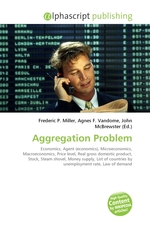Aggregation Problem
Frederic P. Miller, Agnes F. Vandome, John McBrewster
бумажная книга
An aggregate in economics is a summary measure describing a market or economy. The aggregation problem refers to the difficulty of treating an empirical or theoretical aggregate as if it reacted like a less-aggregated measure, say, about behavior of an individual agent as described in general microeconomic theory (Fisher, 1987, p. 54). Examples of aggregates in micro- and macroeconomics relative to less aggregated counterparts are: food vs. apples, the price level and real GDP vs. the price and quantity of apples, the capital stock for the economy vs. the value of computers of a certain type and the value of steam shovels, the money supply vs. paper currency, the general unemployment rate vs. the unemployment rate of civil engineers. Standard theory uses simple assumptions to derive general, and commonly accepted, results such as the law of demand to explain market behavior. An example is the abstraction of a composite good. It considers the price of one good changing proportionately to the composite good, that is, all other goods.
Данное издание не является оригинальным. Книга печатается по технологии принт-он-деманд после получения заказа.


